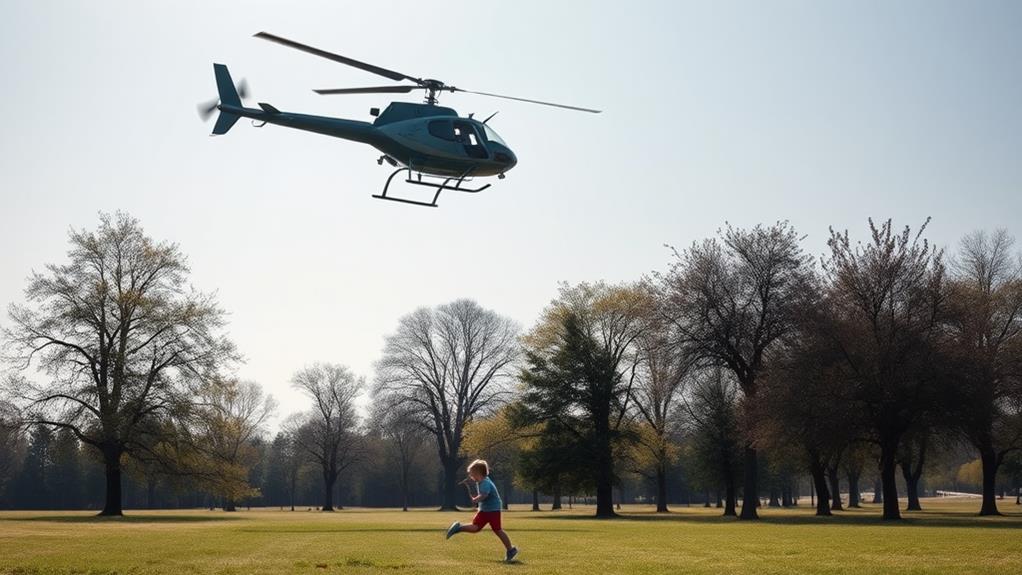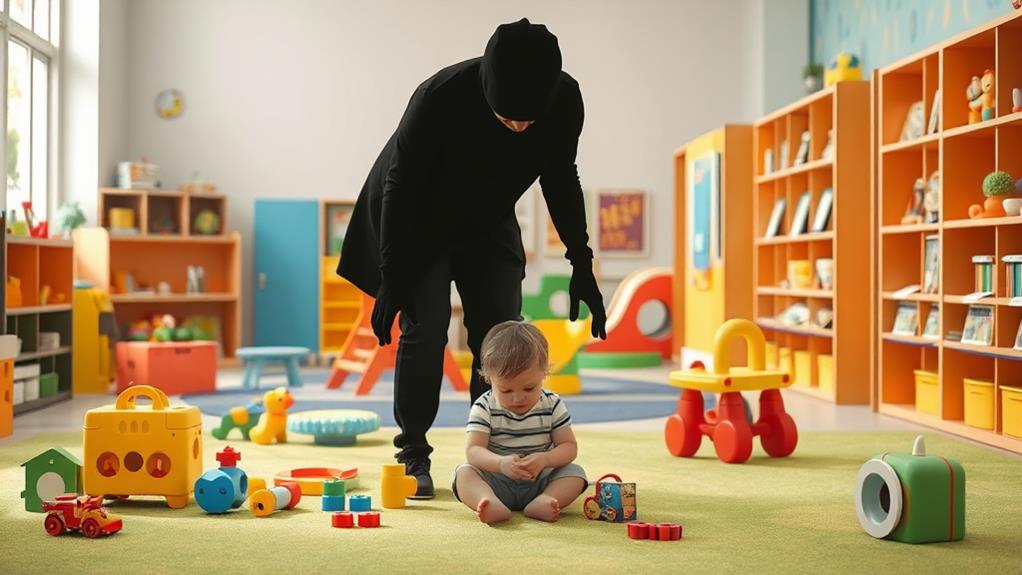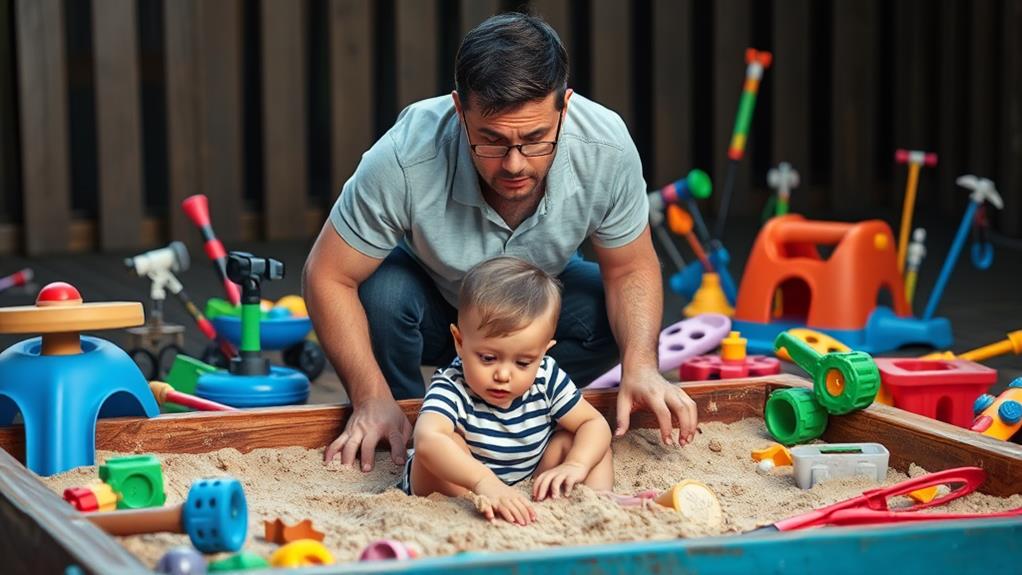You might not realize it, but your parenting style could be affecting your child's emotional growth in profound ways. Helicopter parenting often manifests through constant oversight, making decisions for your child, and an inability to let go. These behaviors might seem protective, but they can stifle independence and self-esteem, leaving children ill-equipped to handle life's challenges. If you've noticed signs of over-involvement, it's worth considering the long-term impact on your child's development. What are these signs, and how can you foster a healthier balance? The answers might surprise you.
Overprotective Behavior

Overprotective behavior is a hallmark of helicopter parenting, where parents excessively shield their children from potential risks and challenges. You might notice this when parents intervene at the slightest sign of struggle or discomfort. For instance, if your child tries to climb a tree, you may rush in to prevent a fall, believing it's for their safety.
While it's natural to want to protect your child, overdoing it can stifle their independence and confidence. When parents constantly step in, kids miss out on valuable learning experiences. They won't develop problem-solving skills or resilience, which are crucial for navigating life's ups and downs.
If you find yourself always making decisions for your child or arranging every detail of their activities, it's time to rethink your approach. Encouraging your child to explore, make mistakes, and learn from them is essential. Allow them to face age-appropriate challenges, whether it's riding a bike or dealing with a disagreement with a friend.
Constant Monitoring
In today's digital age, constant monitoring can be a significant sign of helicopter parenting. You might find yourself checking your child's phone, tracking their location through apps, or keeping a close eye on their social media activities.
While you may believe you're protecting them, this behavior can actually create a sense of distrust. Your child might feel like they can't have any privacy or independence, leading to feelings of resentment.
When you're always watching, it can hinder their ability to make choices and learn from mistakes. Children need space to explore and develop their own identities.
If you're constantly hovering, they mightn't know how to handle challenges on their own. This lack of trust can also affect their self-esteem, making them doubt their abilities.
Instead of monitoring every move, consider encouraging open communication. Discuss their activities and interests, and let them know you're there to support them.
Excessive Involvement

When constant monitoring spills over into excessive involvement, it can further stifle your child's growth. You might find yourself stepping in for every project, whether it's helping with homework or deciding who they should be friends with.
While your intentions are good, this level of interference can limit your child's ability to think independently and solve problems on their own. Excessive involvement can lead your child to feel overwhelmed or incapable of making decisions. They may start to rely on you for everything, which can diminish their confidence and self-esteem.
Instead of learning from their mistakes, they might wait for your guidance, missing out on valuable life lessons. It's important to encourage your child to take ownership of their activities, even if that means letting them struggle a bit.
By stepping back, you allow them to explore their interests, make choices, and develop critical thinking skills. Remember, you don't have to be the answer to every question. Trusting your child to handle situations on their own fosters resilience and independence, equipping them for future challenges.
Give them space, and watch them thrive!
Difficulty Letting Go
Letting go can feel like watching your child ride a bike for the first time—exciting yet terrifying. You want to support them, but you also worry about what might happen if you take a step back. It's natural to feel this way, but when you find it hard to let go, it can lead to helicopter parenting. This means you're constantly hovering, ready to swoop in at a moment's notice.
You might notice yourself double-checking their homework or calling their teachers to ensure everything's okay. While staying involved is important, excessive control can hinder your child's ability to learn and grow independently.
If you struggle with letting go, ask yourself why. Are you anxious about their choices, or do you fear they won't succeed without your help?
Ignoring Child's Independence

One key sign of helicopter parenting is ignoring your child's independence. When you constantly step in to solve their problems or make decisions for them, you might be stifling their ability to grow and learn.
Children need space to explore their interests, make mistakes, and develop their own judgment. If you find yourself hovering over their every move, it's time to reassess your approach.
Encouraging independence helps children build confidence and self-reliance. Instead of automatically providing answers or intervening in conflicts, give them the chance to tackle challenges on their own.
For example, if they're struggling with a school project, resist the urge to take over. Instead, ask guiding questions that prompt them to think critically and arrive at solutions themselves.
Managing Friendships
Frequently, helicopter parents find themselves overly involved in their child's friendships. This can lead to issues like your child relying on you to manage every social interaction. You might feel tempted to intervene when conflicts arise, but this can hinder your child's ability to resolve problems on their own. Instead of stepping in, encourage them to communicate their feelings and work things out with their friends.
It's important to allow your child to choose their friends, too. You might have concerns about their choices, but trusting their instincts is essential. When you impose your preferences on their friendships, it can create tension and resentment. Your child needs to learn how to navigate social circles, build connections, and occasionally face rejection.
Try to be a supportive listener instead of a director. Ask open-ended questions about their friendships, like what they enjoy doing together or how they handle disagreements. This approach helps them reflect on their relationships and enhances their decision-making skills.
Ultimately, managing friendships should be your child's responsibility, with you as a guiding presence, not an overseer. By stepping back, you'll help them grow more confident in social situations and develop healthier relationships.
Overemphasis on Achievement

When you focus too much on your child's achievements, it can create pressure that stifles their natural motivation. Instead of fostering a love for learning and growth, you might unintentionally push them to meet unrealistic expectations. Your child may start to feel like their worth is tied to grades, trophies, or accolades rather than who they're as a person.
This overemphasis on achievement can lead to anxiety, burnout, and a fear of failure. When kids feel they must constantly perform, they might avoid challenges, fearing they won't meet your standards. They may also struggle to develop resilience, as they haven't learned how to cope with setbacks without your intervention.
Encouraging a balanced approach is crucial. Celebrate their accomplishments, but also emphasize effort, creativity, and personal growth. Teach them that it's okay to make mistakes and that these experiences can lead to valuable lessons.
Emotional Dependency
How can you tell if your child is becoming emotionally dependent on you? One clear sign is when your child constantly seeks reassurance from you, feeling anxious or unsure without your input. If they rely on you to make decisions, even about small things, it might indicate emotional dependency.
You might notice they struggle to express their feelings independently or have difficulty forming friendships, often preferring to stay close to you.
Additionally, if your child tends to avoid challenges, waiting for you to step in and solve problems, that's another red flag. They might also have trouble coping with setbacks, becoming overly upset when things don't go their way.
This dependence can lead to issues in their self-esteem, as they may feel incapable of handling life's ups and downs without your help.
Encouraging independence is essential for your child's growth. You can gently guide them to make their own decisions, celebrate their successes, and support them when they face challenges.
